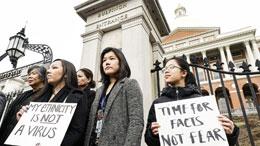COVID-19 triggers pandemic of hate

From Canada and the U.S. to Europe and across Asia, the global coronavirus pandemic has brought with it an increase in racist attacks and microaggressions against people of Asian descent.
Cities across the world have seen an increase in hate crimes in recent weeks. Every day, more stories emerge about Asians targeted by racist slurs, harassment, and even violence in their own communities.
In normally tolerant Canada, a recent survey in the nation’s biggest cities, said they do not believe it’s safe to sit next to an Asian or Chinese person on a bus if they’re not wearing a mask.
Four percent of respondents said they think all Chinese or Asian people are carrying the COVID-19 virus, while 10 percent said they “were uncertain about that.”, according to research from the Chinese Canadian National Council For Social Justice.
Susan Eng, the director of the CCNC-SJ, says with results like this, it’s not surprising we are seeing an increase in anti-Asian racism.
“Canada’s leaders must stand up and unequivocally denounce every such racist incident and ill-informed belief, lest this behaviour is deemed acceptable and others are invited to do the same,” Eng said in a release.
Vancouver Police Department said it had seen an uptick in the number of racially-motivated crimes, with almost half of cases in March reported as anti-Asian as the province marks Asian Heritage Month in British Columbia.
“Asian Heritage month is also a reminder that our multicultural society makes this province such an amazing place to live. I have seen the rise of anti-Asian racism and hate crimes in our province due to the COVID -19 pandemic. Any act of racism is unacceptable and everyone deserves to feel safe,” said Anne Kang, BC’s minister of Citizens’ Services and responsible for Multiculturalism.
South of the border, propelled by the anti-China rhetoric of President Donald Trump, the FBI reported that Chinese and Asian Americans are now experiencing increased hate crimes due to the coronavirus global outbreak.
Between mid-March and mid-April around 1,500 attacks or harassment cases were recorded across the United States with most instances occurring in California and New York, according to Stop AAPI Hate, an association of several NGOs in the United States that has launched a hotline to track verbal abuse, assault and hate crimes against Asian-Americans related to the outbreak of COVID-19.
In Australia, the Federal Government has urged people to report and call out racist attacks when they see them and to not retaliate against Chinese Australians for any feelings they may have towards Beijing.
The Australian Human Rights Commission said that about one in four people who lodged racial discrimination complaints in February and March said they were targeted due to coronavirus.
Why you can trust Sky News
Hate crimes against Chinese people in the UK have also soared during the coronavirus outbreak, new police figures have revealed.
At least 267 offences were recorded in the first three months of 2020 during the COVID-19 crisis - including assaults, robberies, harassment and criminal damage, police said this week.
Victims described being punched, spat at and coughed on in the street as well as being verbally abused about coronavirus after the first case was reported in China.
The European Union’s Agency for Fundamental Rights (FRA) said in a report that people (perceived to be) of Chinese or Asian origin, are also facing discrimination in accessing health services.
It said certain government measures across the EU to combat the spread of COVID-19 could have “profound implications” for fundamental rights.
“The COVID-19 pandemic triggered an increase in racist and xenophobic incidents against
people (perceived to be) of Chinese or Asian origin, including verbal insults, harassment, physical aggression and online hate speech,” the report stated.
Moreover, the study noted that certain politicians and public figures across member states have been using “derogatory and xenophobic language towards people of Chinese and Asian origin.”
The coronavirus pandemic has also triggered a wave of anti-Chinese sentiment throughout Southeast Asia, with some businesses refusing to accept Chinese customers and authorities conducting surprise health checks on foreign workers.
Islamic State affiliates in Indonesia are using the coronavirus to stoke resentment towards Chinese Indonesians, while in the Philippines, the Adamson University in Manila has openly called for its “Chinese” students to stop attending classes.
The Philippines’ decision to allow gaming firms to resume their operations ahead of other local businesses has also been met with fierce criticism, but officials insist the move is necessary as the government needs the revenue to fund its response to the Covid-19 pandemic.
They employ tens of thousands of Chinese nationals, many of them illegal workers, and are largely located in the Metro Manila region where the strict quarantine is not due to be lifted until May 16.
In India, the outbreak has triggered deep-rooted racism against people from the north-east of the country who generally have lighter skin.
Renowned writer Arundhati Roy said was India's ruling Bharatiya Janata Party (BJP), was exploiting the public health crisis unleashed by the COVID-19 pandemic to ramp up suppression of Muslims.
Political experts said that they wouldn't go as far to say that the Indian government is purposely stoking communal tensions to trigger something genocidal. Nonetheless, they agree that the current situation in the country is deepening the religious divide between Hindus and Muslims.
Many COVID-19 cases reported across India were linked to a Muslim congregation held in Delhi last month by an Islamic sect called Tablighi Jamaat. After Indian authorities identified the sect as the biggest cluster of coronavirus cases in the country, many people started blaming the Muslim community for the spread of the disease. – with Agencies









